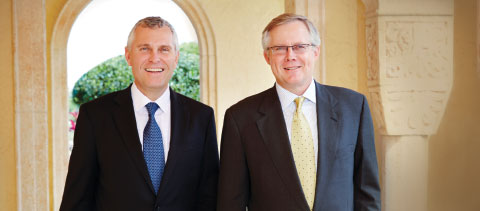
Letter to Shareholders
The title of this year's annual report, Fundamentals, speaks to the drivers of Bunge's past accomplishments, our current focus and the critical foundation for tomorrow's success. In this letter, my last as CEO, I will touch upon the fundamentals as I see them. None is more important, and none gives me greater confidence, than the strength of our people. In Soren Schroder, who will become CEO on June 1, in our extended management team and in our thousands of dedicated employees worldwide, we have capable hands that will lead Bunge to a profitable future.
Competitive Fundamentals
In the late 1990s, the Board of Directors and I saw clear opportunities in agribusiness and food—burgeoning demand for products in emerging markets, productivity achievements among farmers in the Americas and Eastern Europe, newly liberalized markets in a globalizing economy. At that time, Bunge was long-established but was not positioned to capitalize on these trends. It was a second-tier player; a regional company that needed to expand; a collection of operations that needed a unified approach and culture. As leaders, our primary mission was to endow Bunge with the capabilities to compete in an exciting market—the fundamentals that would unlock a new era of growth and performance.
We did this and more. Total shareholder returns since Bunge's IPO in 2001 have averaged 15.5% per annum and enterprise value has increased 5 times. Our balance sheet is significantly stronger and our operations are more efficient, safe and sustainable. Since 2008 we have saved over $500 million through operational excellence programs; lost-time accidents among our employees have decreased by 75% since 2004; and after setting public goals in 2010 we have reduced materially our water use, greenhouse gas emissions and waste.
Today, Bunge is in a position of strength. We have the right fundamentals: a global network of efficient facilities, an integrated chain of operations that stretch from farm gate to retail shelf, a diversified product portfolio, excellent risk management, a talented multinational team and a strong entrepreneurial culture. Together, these attributes form a foundation for future success. And we are building on it in important ways: expanding in key geographies and adjacent businesses, building an innovation platform across segments, re-imagining our approach to talent management and instituting more systematic and aggressive efforts in operational excellence.
The market opportunities remain compelling. In the coming decades, more of the world's growing population will be eating better diets than in any time in human history. Today 50% of the world lives in urban areas. By 2050 that share will grow to 70%. By 2020 the middle class, those earning over $5,000 per annum, will swell by 4.9 billion. In Sub-Saharan Africa, consumer spending should more than double to nearly $1 trillion by 2020.
Trade will become more vital, as agricultural production expands in North and South America, Eastern Europe and Africa—regions with the agronomic assets necessary for large-scale production. The ability to manage volatility will be required as competition for resources and climate change generate potential pressures on, and volatility in, supply.
In short, the services Bunge provides will be even more essential—and more valued.
Fundamentally Improving Performance
Bunge's results in 2012 reflected our ability to capitalize on these compelling trends and also areas in which we need to improve.
On the positive side, Bunge produced record full-year agribusiness results and solid food & ingredients earnings in a challenging environment. Successive droughts in the Americas, and dry conditions in Europe and other regions, led to production shortfalls in key crops, including corn and soybeans. Global stocks tightened, prices reached dizzying heights and demand and trade flows shifted markedly. To produce strong results in such a volatile period required tremendous risk management skill and truly global operations. It is fair to say that in 2012, we showed the power of the businesses we have built over the past decade.
We also took steps to strengthen these businesses—moving forward with joint venture oilseed processing projects in Romania and Paraguay, extending our agribusiness origination network in Sub-Saharan Africa and Australia, expanding our wheat milling presence in Mexico, and strengthening our business in India with new production facilities and the acquisition of Amrit Banaspati, a leading producer of branded fats and oils.
In 2012 we also agreed to sell our Brazilian retail fertilizer business. This step will create a more streamlined operation with less price risk. Moving forward, our ongoing fertilizer business will serve as a stronger, more appropriately scaled complement to our core agribusiness operations.
In sugar & bioenergy, however, we are not producing the value we should or can. The returns in this segment have to be better, and we are taking fundamental steps to see that they are.
Our principal goal is reducing unit production costs. Last year we planted or replanted 68,000 hectares of sugarcane, which should help us crush at our full capacity of 21 million metric tons this season and dilute the naturally high fixed costs of this business. We are taking other steps to improve the efficiency of our cultivation, harvesting and industrial activities, as well. We expect unit costs per ton of cane and ton of sugar to fall by 10% and 15%, respectively, this year when compared to 2012.
